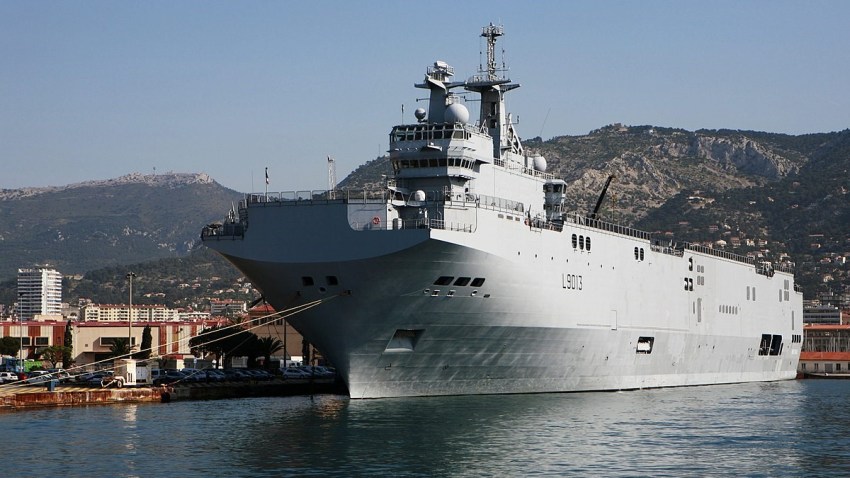When then-French Defense Minister Herve Morin was asked about the prospect of France selling Mistral amphibious assault ships to Russia
in a 2010 interview, he spoke of the need for a new kind of relationship with Russia. “We can’t go on calling for a strategic peace and security partnership” with Russia, he told the newspaper La Tribune, and “see the Russians simply as heirs of the Soviet Union.”
Somewhat more practically, he also welcomed “the fact that we can hope to get a major contract for French industry.”
Four years later, prospects are remote for the kind of Western rapprochement with Russia Morin envisioned. But the $1.6 billion contract to sell two Mistrals remains, and despite pressure from the United States and others, the administration of French President Francois Hollande still plans on following through.
French shipbuilder DCNS, one of the lead builders of the Mistral, markets the 22,000-metric ton vessel as a multipurpose command ship
that can deploy “troops, helicopters, vehicles and equipment from the sea.” Although the company stresses the ship’s “humanitarian assistance and disaster relief” capabilities, critics of the sale worry that the ships will enhance Russia’s ability to carry out amphibious assaults on smaller neighbors.
“The French understand why” the United States is putting pressure on them to halt the sale, says Martin Michelot, a Paris-based researcher with the German Marshall Fund. Although the Mistral contract was concluded by the administration of Hollande’s predecessor Nicolas Sarkozy, he adds, U.S. pressure on Hollande will likely “not change anything in French calculations” unless Russia triggers a “full-on conflict with the West.”
But U.S. lawmakers are intent on trying to change Hollande’s mind, or at least make their displeasure known. On Thursday a group of U.S. senators, five Democrats and one Republican, called on France to cancel the sale and “end all cooperation [with Russia] on future construction.” While they expressed their understanding of the difficult choice that France faces in potentially foregoing a major sale at a time of stressed budgets, they nevertheless said that the country should demonstrate that it will not be “
complicit in altering borders by force.”
A letter from three House members made a similar point the week before. “It is critical that NATO countries no longer provide powerful weapons to enhance Russia's ability to intimidate or even invade its neighbors,” they wrote. As an alternative,
they suggested that “NATO collectively purchase or lease the warships as a common naval asset,” citing previous examples of joint NATO procurement.
This U.S. push is consistent with a longer-term strategy of punishing Russian actions toward Ukraine by isolating the Russian defense sector and denying it access to advanced foreign technologies. Earlier this year the White House announced a policy of
blocking U.S. high-technology exports that could provide military benefits to Russia.
But France has compelling reasons to hold up its end of the Mistral deal. As in the United States, the French defense industrial sector represents jobs and economic activity. French defense spending remains low and
will likely drop further; French Defense Minister Jean-Yves Le Drian last month warned that the trend could have “
disastrous industrial consequences” for France.
In this context, exports are an attractive way to generate revenue and make key programs more affordable. U.S. and French arms suppliers have competed in recent years to supply major platforms like combat aircraft. Big export deals are hard to come by, however, and giving them up may be even more difficult. Any future sales would take time to conclude.
Michelot calls the Mistral sale “vital for the livelihood of the French defense” sector, and the shipbuilding industry in particular.* Cancellation of the sale, which he calls very unlikely at this point, would mean a loss of 1,000 jobs in shipyards, a roughly $1.4 billion fine for France and a loss of competitiveness for French shipbuilders if France failed to locate a substitute buyer.
But even if France agreed to cancel the sale, how would it affect Russia? Petr Topychkanov of the Carnegie Moscow Center argues in an email that Russia has “no urgent need for these vessels.” He adds, however, that Russia has longer-term reasons for seeking the Mistrals, including technology transfer, the prospect of dividing the West and the desire to project power.
Over the longer term, he says, U.S. attempts to squeeze Russian military imports will encourage Russia to be more self-reliant in its approach to defense procurement. This could slow down Russian modernization efforts, especially as the country continues to make up for capabilities, capacity and expertise lost during the economic upheaval of the 1990s.
Unless the Russians decide to significantly escalate the face-off with the West, it appears that U.S. lawmakers will need to work harder to change minds in France. In the meantime French Foreign Minister Laurent Fabius
clarified the current state of the contract on Twitter last week: The contracts were signed in 2011, they represent many French jobs and they will be executed.
* Editor's note: This sentence was revised for clarity.

